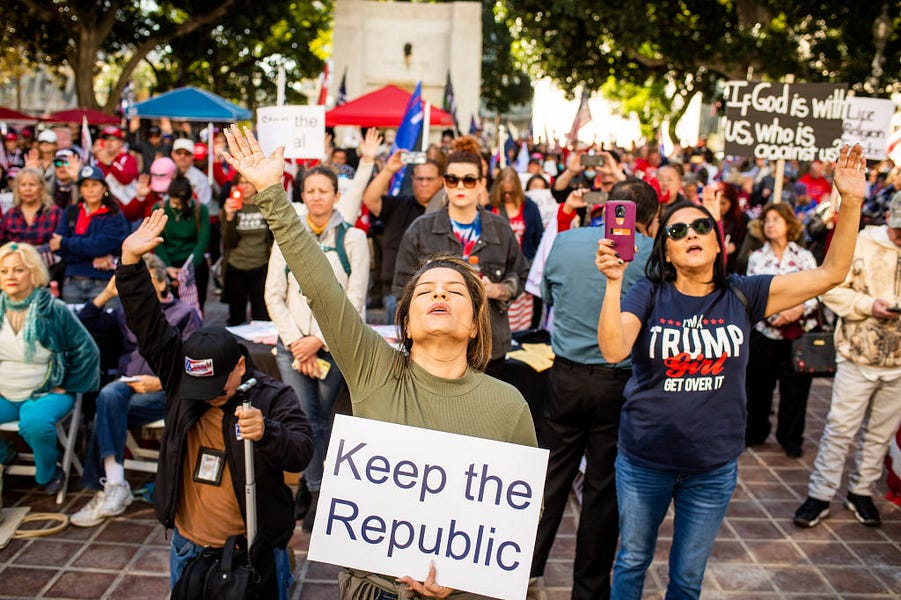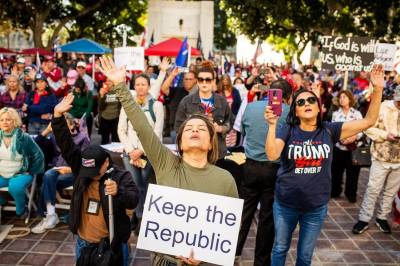Taken from The Religion of American Greatness: What’s Wrong with Christian Nationalism by Paul D. Miller. Copyright 2022 by Paul D. Miller. Used by permission of InterVarsity Press.
“America is winning again. America is respected again. Because we are putting America first. ... We’re taking care of ourselves for a change, folks. ... You know they have a word, it sort of became old fashioned, it’s called a ‘nationalist.’ And I say, really? We’re not supposed to use that word. You know what I am? I’m a nationalist. Okay? I’m a nationalist.” President Donald J. Trump proudly spoke these words to a crowd in Houston in October 2018. The crowd roared its approval and broke into a chant: “USA! USA! USA!”
The media treated this as news, but to close observers it had been evident for a long time. Trump plainly was not a conservative as defined by the political right since the 1950s. It was at first hard to identify Trump’s place on the political map because nationalism had been underground, so to speak, for a few generations. In its place, conservatism, as articulated by thinkers like William Buckley and Russell Kirk and practiced by statesmen like Ronald Reagan and George H. W. Bush, served as the quasi-official ideology of the political right. Conservatism stressed the paramount value of human liberty within a framework of limited government. But Trump had at various points endorsed abortion, trade restrictions, gun control, and other positions at odds with the modern Republican Party and the conservative movement. Trump did not use the rhetoric of liberty, limited government, or constitutionalism. He talked about national greatness, cutting advantageous trade deals, and looking out for “America First.” Trump’s success illustrated a broader phenomenon. By 2016 it had become evident that “conservatism”—its intellectual coherence, philosophical depth and rigor, and the consonance some saw between it and biblical political theology—was the working ideology of a tiny circle of intellectuals, not the voice of a broad movement. The political right was—and, in fact, had long been—far more indebted to nationalism than to conservatism. Donald Trump recognized this reality and rode it to the White House.1
American nationalism is infused with the rhetoric and symbols of Christianity. When Trump pitched himself as a champion of regular Americans, he repeatedly and explicitly cast it as an appeal to Christians. In June 2016 he told the Faith and Freedom Coalition, “We will respect and defend Christian Americans.” In August 2016, he told a group of pastors in Orlando, “Your power has been totally taken away,” but under a Trump administration, “you’ll have great power to do good things.” In September 2016, Trump told the Values Voters Summit, “[In] a Trump administration, our Christian heritage will be cherished, protected, defended, like you’ve never seen before. Believe me.” At the same venue the following year, after his election, Trump reminded them of his promise. “I pledged that, in a Trump administration, our nation’s religious heritage would be cherished, protected, and defended like you have never seen before,” he claimed. “That’s what’s happening. ... We are stopping cold the attacks on Judeo-Christian values. ... We will defend our faith and protect our traditions.” In June 2020, amid nationwide protests against police brutality and racial injustice, Trump posed for a photo holding a Bible in front of St. John’s Church, a historic church one block north of the White House (after police forcibly evicted protesters in the area) to “show a message of resilience and determination” according to the White House Press Secretary. Days later Trump said he believed “Christians think it was a beautiful picture.”
Nor is this recent: American Christians have long merged their religious faith with American identity. In the seventeenth, eighteenth, and nineteenth centuries, Americans regularly described the United States as a “new Israel”; in the twentieth century, as a “Christian nation.” When they do so, they are expressing a collection of beliefs: that to be a faithful Christian in America, one must be loyal to the American nation; that the American nation is defined in part by Christian values and Christian culture; that it is, in some sense, the outworking of Christianity in political form; that it may enjoy a special relationship with God; and that American Christians should ensure their government keeps Christianity as the predominant ordering framework for our public life. American national identity has long been defined by many Americans to include Christianity as a necessary part of it. Since at least the Civil War, Americans have regularly read 2 Chronicles 7:14 (“If my people who are called by my name humble themselves, and pray and seek my face and turn from their wicked ways, then I will hear from heaven and will forgive their sin and heal their land”) and Psalm 33:12 (“Blessed is the nation whose God is the Lord”) and applied it to themselves and the United States: Americans are the people called by God’s name, and the United States is the nation whose God is the Lord. Seen in this light, the Christian Right, a broad social and political movement that arose in the late 1970s, is not new in its effort to define the United States as a Christian nation. Rather, the movement stands solidly within the tradition of American Christians—mostly White—who define their sacred and secular identities in terms of each other. The Christian Right is the latest in a long line of White Protestant American nationalists.
In response to Trump’s campaign pitch aimed at them, 81 percent of White, self-identified evangelical voters cast their votes for him, and they remained a core base of his support throughout his presidency. Their acceptance of Trump suggests that many American evangelicals have accepted nationalism as their political philosophy: at a minimum, as something that is consistent with their faith; at most, as the necessary political implication of Christian belief and practice. In a recent survey, a staggering 65 percent of Americans believed it was “fairly” or “very” important that a citizen be a Christian to be “truly American,” including 75 percent of those scoring highest on measures of nationalism.2 In other recent polls, 29 percent of Americans believed that “the federal government should declare the United States a Christian nation,” and almost two-thirds that “God has granted America a special role in human history.”3
Christian nationalism asserts that there is something identifiable as an American “nation,” distinct from other nations; that American nationhood is and should remain defined by Christianity or Christian cultural norms; and that the American people and their government should actively work to defend, sustain, and cultivate America’s Christian culture, heritage, and values. Historians have often argued that a generic Protestant Christianity served as the de facto established religion of the United States until the 1960s. A Christian nationalist is someone who believes that historical fact is normative for today, that the United States should return to the days of a quasi-official, nondenominational (Judeo-) Christian establishment that privileges Christian norms, values, symbols, culture, and rhetoric in American public life and public policy. They do not advocate repeal of the First Amendment, but they do favor a strongly “accommodationist” interpretation of it in which the government is permitted to favor religion over irreligion, and even favor America’s historically predominant religious tradition (i.e., Christianity) over new or different ones. Christian nationalists believe that the American nation was, is, and should remain a “Christian nation”—that America’s identity as a Christian nation is not merely a historical fact but a moral imperative, an ideological goal, and a policy program for the future, which also means that defining the nation’s religious and cultural identity is rightfully part of the government’s responsibility.
What are the origins, historical development, key beliefs, and political and cultural implications of American Christian nationalism? Is it a good thing or a bad thing? What is its relationship to the ideals of the American experiment? What does nationalist governance look like in practice, and what effects has it had on American society and the world when they have had opportunities to pursue their agenda in the past? What is the difference, if any, between nationalism and patriotism? What is the right way to love one’s country? To these historical and political questions, we can add a host of theological ones. What is the relationship between Christian nationalism and Christianity? Between Christian nationalism and other forms of Christian political engagement? Does the Christian faith permit, or possibly even require, its adherents to believe in the tenets of nationalism? In short, do American Christians have to be nationalists? Do Americans have to be Christians? These questions raise broader and deeper questions about the relationship between religion and politics, questions that have been asked ever since the Pharisees used a question about taxes to suss out Jesus’ take on collaboration versus resistance toward civil government, and about humankind’s ultimate loyalties.
Anatol Lievin noted as early as 2004, more than a decade before Trump, that the Republican Party was more accurately understood as the American Nationalist Party; see his America Right or Wrong: An Anatomy of American Nationalism (New York: Oxford University Press, 2004).
Bart Bonikowski and Paul DiMaggio, “Varieties of American Popular Nationalism,” American Sociological Review 81, no. 5 (2016): 949‑80.
Andrew L. Whitehead and Samuel L. Perry, Taking America Back for God: Christian Nationalism in the United States (New York: Oxford University Press, 2020), 10.







Please note that we at The Dispatch hold ourselves, our work, and our commenters to a higher standard than other places on the internet. We welcome comments that foster genuine debate or discussion—including comments critical of us or our work—but responses that include ad hominem attacks on fellow Dispatch members or are intended to stoke fear and anger may be moderated.
With your membership, you only have the ability to comment on The Morning Dispatch articles. Consider upgrading to join the conversation everywhere.